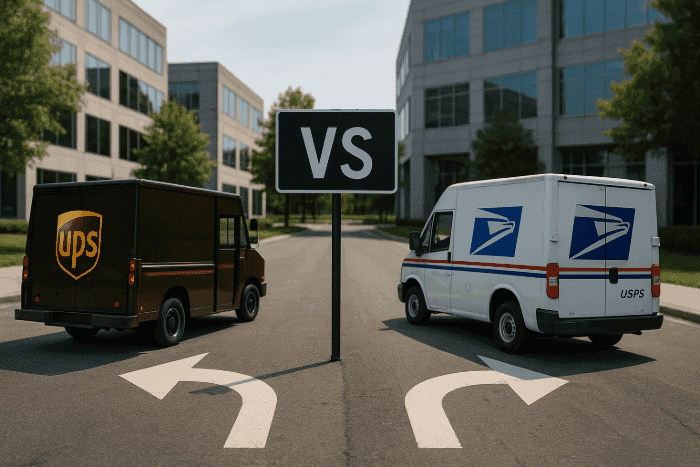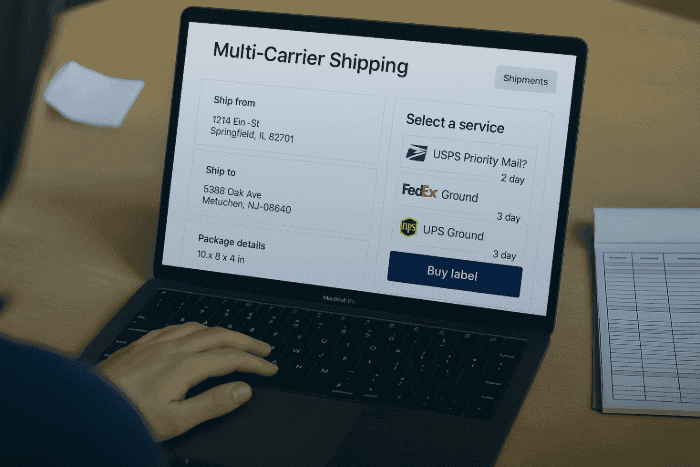Becoming a successful business is not a matter of luck; it is a collection of right choices and adaptability to the market. And when it comes to shipping, choosing the right carrier isn’t just a logistics decision; it’s a cost, speed, and customer experience decision.
For small and midsize businesses in the U.S., two names rise to the top thanks to their long history and placement in the minds of people: UPS and USPS. Both have their strengths, and both have their weak points to consider. Making the best choice will only depend on your specific shipping profile.
In this guide, we’ll break down the key differences between UPS and USPS, from pricing and tracking to package size, speed, and reliability. You’ll also learn how Airpals helps you manage both carriers in one place, without switching tabs or juggling systems.
Let’s start with the basics.
Table of Contents:
- UPS vs USPS: Core Differences for Businesses
- UPS Shipping Rates vs USPS
- Which Carrier Offers Faster, More Reliable Shipping: UPS or USPS?
- When Should a Business Use UPS vs USPS?
- Key Takeaways
- Simplify all your UPS and USPS choices with Airpals!
- Frequently Asked Questions
UPS vs USPS: Core Differences for Businesses
Before diving into costs and performance, here’s a side-by-side comparison of the most essential features of each carrier and how they impact your business operations:
| Feature | UPS – Private Carrier | USPS – National Postal Service |
|---|---|---|
| Type of Service | Privately owned, global logistics | Government-operated mail delivery |
| Best for | Heavy, high-value, or urgent shipments | Light parcels, letters, residential delivery |
| Tracking | Real-time with delivery estimates | Basic, milestone-based updates |
| Weekend Delivery | Saturday (extra fee), no Sunday | Saturday included; Sunday for some services |
| Insurance | $100 included; more available | $100 included for Priority Mail |
| Pickup & Drop-off | Scheduled pickups, UPS Stores | USPS offices, mailboxes, PO boxes |
Each option has its place. USPS is strong on coverage and affordability, while UPS excels at speed and business-grade services. Understanding when to use each is key to a lean, scalable shipping operation, and that’s why we are here for you now.
UPS Overview
UPS (United Parcel Service) is a privately owned logistics company known for its reliable ground and express services, strong B2B network, and detailed tracking. It’s a preferred carrier for businesses that ship high-value, time-sensitive, or bulky products, especially when customer expectations are high.
With services like Ground, Next Day Air, and Worldwide Express, UPS offers scalable solutions for both domestic and international deliveries. Its tracking capabilities include real-time updates, estimated delivery windows, and enhanced exception handling, making it ideal for business-critical shipments.
Want to learn more about how UPS Ground works? Check this entry that goes deeper into the features of their service.
USPS Overview
USPS (United States Postal Service) is a government-run service with unmatched nationwide coverage and budget-friendly options. It’s the top choice for small packages, residential delivery, and low-weight mail, particularly for eCommerce sellers, subscription services, and occasional shippers. When you think of this service, the image that comes to mind is the classic mailman from old movies and shows. Shorts, a leather bag, small packages, and a smile.
With services like First-Class Mail, Priority Mail, and Flat Rate shipping, USPS provides an affordable entry point into logistics. It also offers flexible drop-off options via mailboxes, retail locations, and PO Boxes, helping streamline last-mile delivery.
UPS Shipping Rates vs USPS
Pricing plays a central role in any shipping decision, especially for growing businesses. Below is a comparison of average shipping rates for common weight tiers. Keep in mind that exact prices vary by location and service level, as well as some other external factors such as intense weather and natural disasters.
| Weight | UPS Ground (avg) | USPS Priority Mail (avg) |
|---|---|---|
| 1 lb | $10.50 | $8.25 |
| 5 lb | $14.80 | $12.35 |
| 10 lb | $21.50 | $18.10 |
These estimates provide a starting point. For accurate, real-time rates, Airpals automatically compares both carriers based on package size, weight, and destination zone.
UPS vs USPS for Small Packages: Which Is Best?
For shipments under 2 lbs, USPS often comes out ahead on price, particularly with First-Class Mail and Flat Rate Envelopes. UPS, however, becomes competitive when size, urgency, or value require enhanced tracking and faster delivery.
Also, consider your geographical location and the availability of dropboxes or offices. Sometimes, the choice might only depend on who’s closer to you.
| Scenario | Best Carrier |
|---|---|
| Under 13 oz | USPS |
| 14 oz – 2 lbs | USPS |
| 2–5 lbs, time-sensitive | UPS |
| Lightweight but bulky | UPS (dimensional pricing) |
If you are planning to ship clothing, accessories, or beauty kits as part of your business or just as gifts for your clients or subscribers, you might want to check our guide for corporate gifting.
Which Carrier Offers Faster, More Reliable Shipping: UPS or USPS?
Speed and reliability vary by service level and destination. Here’s how the two compare for both standard and express deliveries:
| Feature | UPS | USPS |
|---|---|---|
| Ground delivery time | 1–5 business days | 1–5 business days |
| Overnight/Express | Next Day Air, 2nd Day Air | Priority Mail Express (1–2 days) |
| Tracking | Real-time, detailed | Basic, fewer updates |
| Delivery guarantees | Yes (for express services) | Limited |
If you are in a rush and need to evaluate overnight options, we’ve got you covered with this guide.
When Should a Business Use UPS vs USPS?
The right carrier depends on your shipping frequency, product profile, and delivery expectations. Here's a quick guide:
Which Carrier Suits High Volume vs Occasional Shipping?
| Shipping Frequency | Ideal Carrier | Why? |
|---|---|---|
| High volume | UPS | Negotiated rates, bulk shipping, platform integrations |
| Occasional | USPS | Affordable, easy access, perfect for small/light parcels |
Domestic vs International: Who Delivers Better and Faster?
| Destination | Best Carrier | Why |
|---|---|---|
| Domestic | USPS (light) / UPS (heavy) | USPS is cost-efficient for small mail; UPS is faster for large orders |
| International | UPS | Reliable customs handling, full tracking, faster delivery times |
Key Takeaways
- UPS is best for heavy, high-value, or time-sensitive shipments that require speed and business-grade reliability.
- USPS is ideal for small, lightweight packages, especially under 2 lbs, and offers better coverage for residential deliveries.
- Shipping costs vary: USPS tends to be cheaper for light parcels; UPS becomes more cost-effective for larger, long-distance, or urgent shipments.
- For small packages (under 13 oz or up to 2 lbs), USPS is generally the smarter choice.
- For bulk or frequent shipping, UPS offers better rates and platform integrations suited for businesses.
- Airpals lets you compare rates across both carriers instantly and generate labels from a single dashboard.
Simplify all your UPS and USPS choices with Airpals!
Choosing between UPS and USPS doesn’t need to slow down your operations. With Airpals Multi-Carrier Platform, you get full access to both carriers, all in one dashboard.
No more switching tabs. No more copy-pasting tracking numbers. No more manual label generation.
With Airpals, you can:
- Generate shipping labels in seconds
- Compare real-time rates across carriers
- Get centralized tracking

Frequently Asked Questions (FAQs)
Which is cheaper: UPS or USPS?
USPS is typically cheaper for packages under 2 lbs. UPS may be more cost-effective for heavier shipments or urgent deliveries. Always compare live rates with Airpals to make the best decision based on weight, speed, and destination and avoid overspending.
Which is cheaper: UPS or USPS for a 5 lb package?
For nearby destinations, USPS may offer lower rates. For long-distance or dimensional shipments, UPS could be cheaper.
Is USPS and UPS the same?
No. USPS is a government-run mail service focused on residential and letter delivery. UPS is a private logistics company offering advanced business services, international shipping, and detailed tracking. They are entirely separate entities with different rates and capabilities.
Which is faster: UPS or USPS?
UPS is generally faster for time-sensitive deliveries, especially with express services. USPS is competitive for standard and local shipments but offers fewer delivery guarantees. Choose based on urgency, distance, and how much tracking visibility your shipment requires.
What is the difference between UPS and USPS?
UPS is ideal for larger, urgent, or international shipments, with advanced tracking and faster delivery. USPS is more affordable for letters, small packages, and standard mail. The right choice depends on parcel size, destination, budget, and customer expectations.
Is UPS more reliable than USPS?
Yes, especially for shipments that require real-time tracking and delivery guarantees. UPS has a stronger reputation for reliability in business-critical deliveries. USPS is dependable for everyday mail but may lack transparency during delays or exceptions.
Is UPS or USPS cheaper for large packages?
UPS is usually cheaper for large or heavy parcels due to better dimensional weight handling. USPS rates may increase significantly beyond flat-rate sizes.




